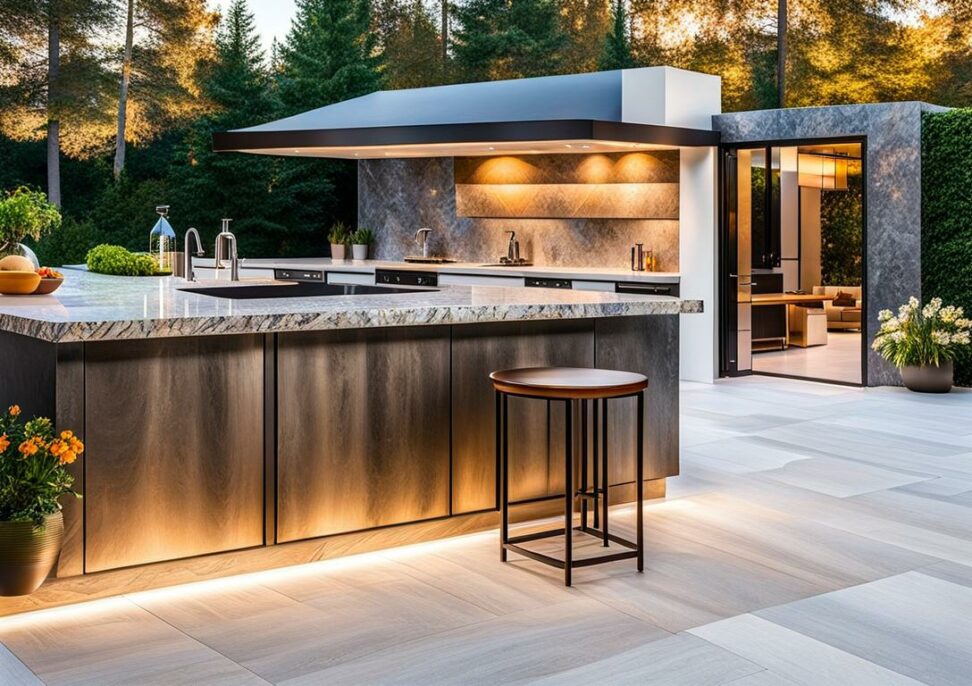Granite vs Quartz for Outdoor Kitchens - A Helpful Comparison
When designing an outdoor kitchen, choosing the right countertop material is one of the most important decisions. Granite and quartz are two of the best options, each with unique benefits.
Outdoor kitchens demand durable, low-maintenance materials that can withstand temperature changes, moisture, and sun exposure. Quartz and granite are both hard natural stones that resist scratches, stains, and damage in outdoor environments.
The Natural Beauty and Variety of Granite
Granite is a traditional favorite cherished for its timeless elegance and one-of-a-kind look. Every granite slab has its own distinct color patterns and veining that lend unique visual appeal. Granite's natural beauty enhances outdoor living spaces with a high-end yet classic style.

With many color and finish options, granite allows you to customize your outdoor kitchen design. Choices range from whites and creams to darker shades of black, brown, and gray. Finishes can be polished for a glossy look or left honed or textured.
Granite's Strengths for Outdoor Kitchens
In addition to beauty, granite boasts these advantages:
- Extreme durability - Granite is nearly impossible to crack or scratch.
- Heat resistance - Excellent tolerance for hot cookware, ideal for grilling.
- Can be refinished - Small damages can be repaired, preserving longevity.
Potential Downsides of Granite
There are a few potential drawbacks to weigh:
- Requires sealing - Porous granite needs sealing every 1-2 years.
- Could stain - Spills must be cleaned promptly before sealing.
- Higher maintenance - More sealing and cleaning needed than quartz.
The Consistency and Durability of Quartz
Where granite is unique, quartz aims for uniformity. Made from ground quartz crystals blended with resins and pigments, engineered quartz has consistent speckled patterns and tone.
With fewer color variations, quartz allows you to achieve a streamlined, contemporary look. Whites, grays, and blacks are quartz staples, but bolder hues are also available.
Benefits of Quartz for Outdoor Spaces
Quartz is arguably the lowest maintenance option because it:
- Never needs sealing - Non-porous surface won't absorb stains.
- Resists damage from sun and moisture.
- Keeps clean with just soap and water.
Potential Limitations of Quartz
A few limitations to factor in include:
- Less heat tolerance - Sudden temperature changes can cause cracks.
- Less diversity - Those desiring unique looks may prefer granite.
- Higher cost - More expensive than some natural stone.
Key Comparison Points
Let's compare some of the most important deciding factors:
Appearance
Granite offers one-of-a-kind elegance. Quartz provides uniformity and modern style.
Durability
Both are extremely sturdy. Granite may outlast quartz but requires more maintenance.
Maintenance
Quartz rarely needs sealing. Granite requires sealing every 1-2 years.
Heat Tolerance
Granite better handles hot pots and pans. Quartz can crack under extreme heat.
Stain Resistance
Quartz resists stains remarkably well. Sealed granite is prone to some staining.
Cost
Granite prices vary widely. Quartz has a narrower mid-range cost.
When deciding between granite versus quartz, consider your priorities. Focus on natural stone beauty or minimal maintenance? Seek traditional or modern styling? Your needs and preferences will guide you to the ideal outdoor countertop material.
Both granite and quartz make superb choices for outdoor kitchens. With Durango Stone's excellent selection of granite and quartz slabs, you can select the perfect countertop to realize your dream outdoor living space.